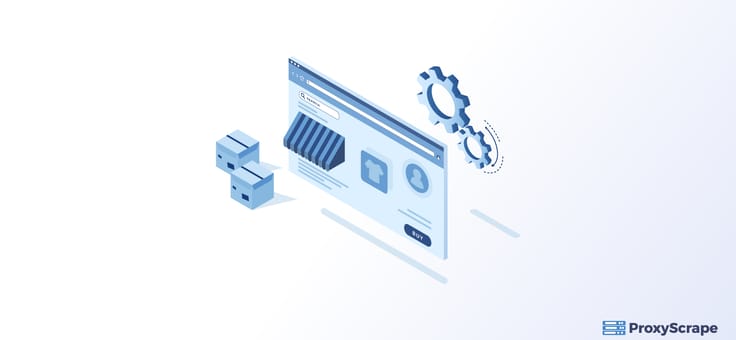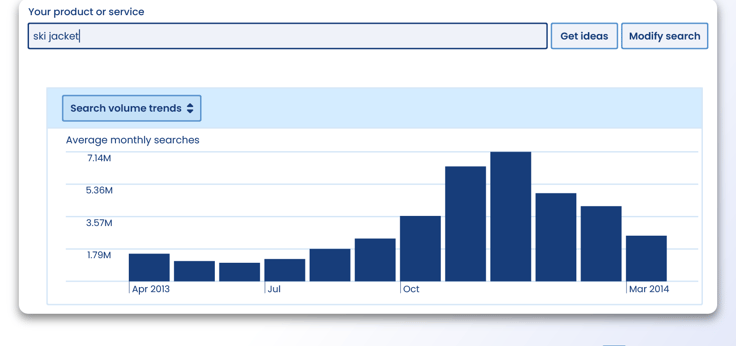How to Overcome Challenges For E-commerce Keyword Research

Over the past decade, E-commerce has influenced the way we do online shopping. A recent study by Statista shows that there has been a considerable increase in online shoppers from 2014-2021 to back this claim. Furthermore, due to the prevailing pandemic, the number of online shoppers incremented to a whopping 2.14 billion. However, having a
Over the past decade, E-commerce has influenced the way we do online shopping. A recent study by Statista shows that there has been a considerable increase in online shoppers from 2014-2021 to back this claim. Furthermore, due to the prevailing pandemic, the number of online shoppers incremented to a whopping 2.14 billion.
However, having a strong online presence for your store is the key to your success in generating more sales and thus standing out from your competitors.
In this article, you will learn how to research keywords so that your consumers can find you on the web. Then you’ll see how web scraping can help you collect a massive amount of data, as well as its considerable limitations and solutions for overcoming them.
But first things first, and let’s focus on what is meant by keyword research in E-commerce.
What is keyword research for E-commerce?
Keyword research is the process of discovering phrases that your customers are likely to search on search engines in order for them to find the exact or relevant matches for their requirements. It often lays the foundation of every SEO (Search Engine Optimization) campaign.
Keyword research requires hard work, dedication, and proper planning to search all relevant words that your consumers are likely to search on search engines. Typically, sellers create a list of business keywords related to their items and categories.

Why is keyword research essential for E-commerce?
Keyword research is the core of every SEO plan, primarily onsite SEO. When done correctly, it gives guidance for the types of content that you need to optimize for.
On the other hand, excellent keywords combined with a poorly implemented approach will not help you earn sales in your E-commerce business. Whereas a thoughtfully crafted keyword research will provide:
- Insights about competitors and their behaviors;
- Insights into the demands of your consumers;
- Understanding the trends of customers;
But the keyword research should include much more than discovering new product keywords. Sellers must also examine the progress of each keyword and study the history of numerous keywords to produce data-driven options.
Even if you opt to outsource your keyword research, understanding the entire process enhances your knowledge and verifies whether the outsourcing agencies are doing their job right.
What factors to consider before keyword research?
Before initiating the keyword research, you need to decide whether to proceed manually or use automated tools. Starting manually from scratch may seem unrealistic because automated tools are redundantly available. Therefore this article would touch upon the automated methods.
Then you need to be aware of the following terminology before entering the keyword discovery process.
Search volume
Search volume is the number of searches users search for a particular parse in a month. Your incoming traffic and conversion potential are likely to skyrocket if you can position your web page to correspond to the top trending terms. There are various keyword tools that show the search volume.

Terms with high search volume have higher competition, which means many users search for such words. The greater the competition, the more difficult it is to rank for those keywords. So, in general, you should use search terms that have a search volume of more than 20 monthly searches.
Ranking difficulty
The ranking difficulty is also sometimes referred to as keyword difficulty. It is the process of determining how difficult it is to rank a particular keyword in SERPs (Search Engine Result Pages). Eventually, the web site’s domain authority for your specific niche comes into play.
The ideal situation would be to target keywords with high search traffic but low competition, although in reality, such keywords are hard to extract.
Search Relevance
Let’s say that you found a keyword that has high search volume with low competition. However, it would be meaningless if it was unrelated to your website and what you were offering.
To put this into perspective, consider the value of 100 qualified prospects generated by a search above 5,000 unqualified visitors who will never buy anything. Eventually, they will leave your website instantly if it fails to deliver what they were hoping to discover due to a relevancy mismatch.
Which E-commerce pages should you optimize?
For your online E-commerce store, you should optimize the home page, service page, and individual product pages with suitable keywords. This is because, if you consider the services or product pages, it is a golden opportunity for you as sellers to persuade your customers into buying your products.
In addition, it gives you a great chance to insert keywords into product or service titles. It is difficult for your web pages to appear on SERPs if you have not optimized their titles and meta descriptions with keywords.
How to perform keyword research for E-commerce?
When it comes to keyword research, there are two approaches; either start manually from scratch or monitor your competitors. To save time and since it’s difficult to define exact ways of researching from scratch, most prefer the latter method.
Research on your competitors’ keywords
After determining where your website ranks, you should look at how your competitors perform for the exact keywords. This will assist you in determining the work that you need to do in order to rank at the top of the SERPs. To stay on top of the current market trends in your industry, you’d need to keep an eye on your rivals regularly.

This method is critical because you will waste conversions if your e-commerce site does not rank among the top results.
Knowing what keywords and terms helped your competitors reach the top of search results may assist you in developing a successful keyword strategy.
Use your favorite keyword tool
It can be challenging which keyword tool to opt for when many providers claim that their solution is ideal. While it is beyond the scope of this article to dive deeper into various keyword tools, let’s provide you with an overview in general about the factors that you need to consider when opting for a keyword tool.
You need to check if it provides
- monthly search volume for each keyword based on multiple locations.
- keyword suggestions: which will be pretty handy when it comes to generating ideas for your content
- Competitor analysis: how your competitors are ranking for a particular keyword
- Assistance with link building and site audits
- Monthly reports on which keywords the visitors have landed on your site, from which locations, etc.
Finalizing the keyword list
After you have noted down the keywords, the next step is to conclude the final keywords you’re planning to use on your web product pages and others pages.
Understanding which websites rank for a specific keyword is critical in determining your potential rank among them. Some terrific leading keywords may not be worth your time, while others with less visibility may be a niche in which you may succeed.
On the other hand, if a keyword search gives results in which the top-ranking firms are the dominant players in the industry, it might be prudent to update the list to avoid such fierce competition.
We hope you have gained a brief overview of the keyword research process. So now, let’s look into a more comprehensive approach where you can extract keywords on a large scale with web scraping.
Web Scraping for E-commerce keyword research
Web scraping has emerged as a viable strategy for e-commerce businesses, particularly in terms of providing significant data-based insights. Typically, merchants want to gather data from E-commerce websites to acquire insights about what’s trendy. Pulling a massive chunk of data from the websites of giant E-commerce firms such as Amazon, Walmart, and eBay, on the other hand, may be a daunting undertaking.
To circumvent such obstacles, you might consider web scraping, which allows you to retrieve data using automated tools.

How could Web scraping help you to stay ahead in your SEO game?
Competitor Analysis
As a wise business owner, you may employ web scraping to examine other E-commerce websites.
These evaluations include questions such as, Where do they discover their most important successes? Where do they face the most difficulties? They can learn to outwit their opponents and gain the upper hand by being astute.
You could also scrape price data of competitors and websites in your similar niche to determine what pricing strategies they use.
Content Comparison: Beating Your Competitors in SEO
Most consumers nowadays go to the initial pages of SERPs for better results for their search queries and do not bother clicking to the second page. As a result, and as we have previously mentioned, you must execute all SEO methods correctly in order to rank on the first page of SERPs.
Unfortunately, the home page of any SERP can show only ten results. Search engine algorithms have specific criteria for determining whether pages are worthy of this accolade.
SEO should be an element of each new company’s digital marketing plan. Most well-known organizations, such as Walmart, have more brilliant SEO tactics that include correctly optimized keywords in their blogs, vlogs, and the content of their web pages. So, with the aid of web scraping, you can uncover such strategies.
So to even begin competing, you must be astute and target just the most popular keywords, as we have previously mentioned. That may not be enough to outrank your opponents in the rankings.
In the end, it all boils down to your expertise. Competitors with large budgets have many options when it comes to generating content. That same information is available to you through web scraping. What you can do with it is as follows:
- Look for terms that have a significant search volume.
- Look up those terms on Google and see what comes up.
- Pay for software that examines web pages for the SEO methods they employ.
- Collect information on the ten sites from the first page of the results.
- Synthesize and improve the practices of many other sites in your content or text.
Your content is far more likely to meet the algorithm’s requirements with this information. The resultant pages may rocket up the ranks, increasing organic visitors. Keep in mind that even a minor improvement in SEO value can significantly impact.
Significant challenges associated with Web scraping for E-commerce.
Like with everything else, unfortunately, web scraping presents some challenges. Here are some of the challenges that you would have to confront with web scraping:
Accessing Geo-restricted data
In keyword research, you need to have Location-based keywords. This is particularly essential when you have branches of your business in different parts of the globe. You may not access specific keywords from different locations as there are geo-restrictions.
As a result, it may make your keyword research incomplete.
Bot Detection
Top E-commerce businesses typically have security measures in place to prevent unwanted bots from entering their sites. These metrics are often incapable of distinguishing the visitor’s purpose. As a result, well-mannered web scraping bots that collect information on e-commerce terms are frequently incorrectly detected, resulting in blockages.
How to overcome the challenges for web scraping for E-commerce?
With the use of proxies, you would overcome accessing geo-restricted content. With ProxyScrape, you can select proxies from multiple locations so that your IP address will not be banned when accessing geo-restricted content.
As for sites blocking your bots, you can use a bot with Residential proxies. You could send multiple requests with different proxies. You may find further information on proxies and web scraping in this article.
Conclusion
Keyword research for your online E-commerce store to optimize it for SEO is a comprehensive process. You may have acquired some valuable insights for keyword research from this article.
As you have discovered in this article, web scraping can do wonders for your SEO strategy to find suitable keywords for your content. However, it would help to overcome some barriers to web scraping mentioned in this article. You can overcome Such challenges easily with a reliable proxy provider’s correct use of proxies.